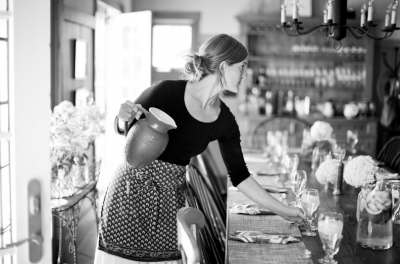How did you get your current good food job?
I wrote a business plan for a cooking school and farm by the sea while in a Culinary Management Program at The Institute of Culinary Education. The concept has evolved into a flourishing supper club as well, where we bring local farmers and their products to the table to discuss the realities of being a farmer or fisherman in Maine.
How did your previous work or life experience prepare you for a good food job?
I worked for Dan Barber at Blue Hill in NYC and experienced first hand what ingredient driven cooking is all about. Later on, I worked as a personal assistant to Tom Colicchio, head judge on Bravo's Top Chef, and learned a great deal about industry trends and the growth of a culinary empire. I've also worked at the Slow Food Headquarters, at the Union Square Farmer's Market as a demo chef and at Restaurants and Cooking Schools in Paris, Provence and Barcelona. All of these experiences have contributed to my work at Salt Water Farm both in the kitchen, out in the garden and around the table.
What was the greatest obstacle you had to overcome in pursuing your Good Food Job dream?
Leaving a successful career in New York City to pursue a new business in a remote part of the world. Learning to be a farmer was also a challenge in a place that has a relatively short growing season. On cold winter nights, when the coyotes were howling at the moon, I questioned my decision to leave a bustling city and thriving food scene. In retrospect, it was the best decision I've ever made. Maine is a beautiful and soulful place and a leader in the sustainable food movement. The people that come to Salt Water Farm are the same folks that I was seeking out in the city, but now they come to me. It's wonderful and enormously satisfying.
What can you identify as the greatest opportunities in food right now?
Continued support of local, sustainable food systems will solve a great deal of challenges that we as a country face. There is a lot of progress to be me made in schools, food distribution systems, on farms, in livestock handling and processing facilities and in the marketing and publicity of these initiatives. And of course, food education. I've sort of lost interest in food trends.
If you could be compensated for your work with something other than money, what would it be?
Bacon and Apple Butter, at least in the fall.









